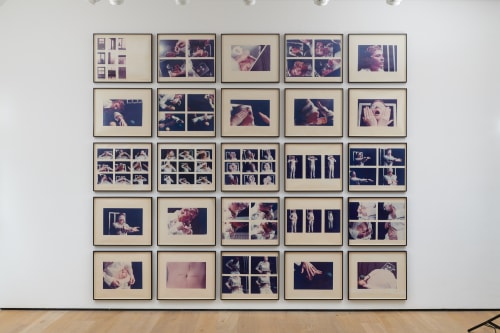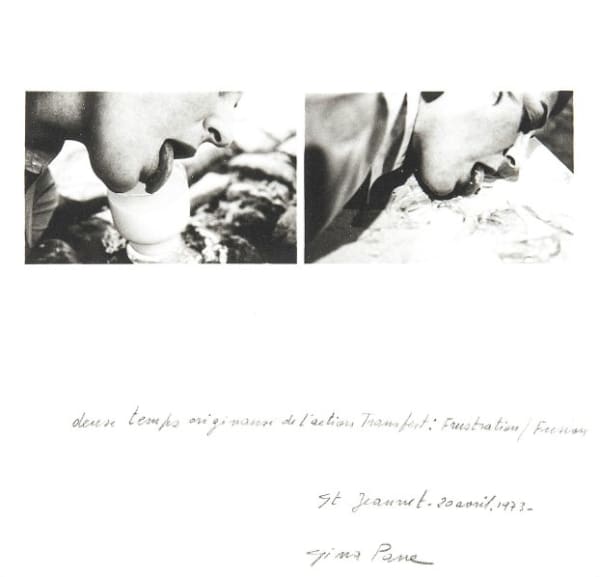Gina PANE: Action Psyché
“If I open my ‘body’ so that you can see your blood therein, it is for the love of you: the Other" – Gina PANE, 1973.
Gina Pane was instrumental to the development of the international Body Art movement, contributing a unique and corporeal language marked by ritual, symbolism and catharsis. The body, most often the artist’s own physical form, remained at the heart of her artistic practice as a tool of expression and communication until her death in 1990.
Coming from the archives of the Galerie Rodolphe Stadler, the Parisian gallery of Pane who were themselves revolutionary in their presentation of avant-garde performance art, her exhibition at Richard Saltoun Gallery celebrates the artist’s pioneering career with a focus on the actions for which she is best known.
-
 Gina PANEAction Psyché, 1973/74A set of twenty-five colour photographs and two preparatory
Gina PANEAction Psyché, 1973/74A set of twenty-five colour photographs and two preparatory
drawings, accompanied by a set of seventy-five colour slides in
a leather box.Each sheet: 48 x 57.5 cm
Unique -
 Gina PANE, Action Psyché (essai), 24 janvier 1974, 1974
Gina PANE, Action Psyché (essai), 24 janvier 1974, 1974 -
 Gina PANE, Azione Sentimentale, 9 novembre 1973, 1973
Gina PANE, Azione Sentimentale, 9 novembre 1973, 1973 -
 Gina PANE, Action Transfert, 19 avril 1973, 1973
Gina PANE, Action Transfert, 19 avril 1973, 1973 -
![Gina PANE, Action II Caso no 2 sul ring [Action The Case n.2 on the ring], 1976](data:image/gif;base64,R0lGODlhAQABAIAAAAAAAP///yH5BAEAAAAALAAAAAABAAEAAAIBRAA7) Gina PANE, Action II Caso no 2 sul ring [Action The Case n.2 on the ring], 1976
Gina PANE, Action II Caso no 2 sul ring [Action The Case n.2 on the ring], 1976 -
 Gina PANE, Deux Temps Originaux de L'action Transfert: Frustration / Fusion, 1973
Gina PANE, Deux Temps Originaux de L'action Transfert: Frustration / Fusion, 1973 -
 Gina PANEAction Privee - cont. 1975, 1975Two vintage silver gelatin photographs, one with hand colouring and both with collage and ink writingEach sheet: 19.6 x 19.2 cmUnique
Gina PANEAction Privee - cont. 1975, 1975Two vintage silver gelatin photographs, one with hand colouring and both with collage and ink writingEach sheet: 19.6 x 19.2 cmUnique -
 Gina PANE, Extraits, 1969-71
Gina PANE, Extraits, 1969-71 -
 Gina PANE, Notes de travail pour l'action Psyché, essai, 1973
Gina PANE, Notes de travail pour l'action Psyché, essai, 1973 -
 Gina PANEPsyché, 1974Ephemera from 'Action Psyché' (1974) contained in a metal and glass case34 x 43 x 10 cmUnique
Gina PANEPsyché, 1974Ephemera from 'Action Psyché' (1974) contained in a metal and glass case34 x 43 x 10 cmUnique
“If I open my ‘body’ so that you can see your blood therein, it is for the love of you: the Other.”
– Gina PANE, 1973
Gina Pane was instrumental to the development of the international Body Art movement, establishing a unique and corporeal language marked by ritual, symbolism and catharsis. The body, most often the artist’s own physical form, remained at the heart of her artistic practice as a tool of expression and communication until her death in 1990. Coming from the archives of the Galerie Rodolphe Stadler, the Parisian gallery of Pane who were themselves revolutionary in their presentation of avant-garde performance art, her exhibition at Richard Saltoun Gallery celebrates the artist’s pioneering career with a focus on the actions for which she is best known. It provides the most comprehensive display of the artist’s work in London since the Tate’s presentation in 2002.
Exploring universal themes such as love, pain, death, spirituality and the metaphorical power of art, Pane sought to reveal and transform the way we have been taught to experience our body in relation to the self and others. She defined the body as “a place of the pain and suffering, of cunning and hope, of despair and illusion.” Her actions strived to reconnect the forces of the subconscious with the collective memory of the human psyche, and the sacred or spiritual. In these highly choreographed events, Pane subjected herself to intense physical and mental trials, which ranged from desperately seeking to drink from a glass of milk whilst tied, breaking the glass and lapping at the shards with her mouth (Action Transfert, 1973); piercing her arm with a neat line of rose thorns (Action Sentimentale, 1973); to methodically cutting her eyelids and stomach with razor blades (Action Psyché, 1973/74); and boxing with herself in front of a mirror (Action Il Caso no. 2 sul ring, 1976) – all performed silently in front of gathered audiences. She interpreted the sacrifice and aestheticised risk of such actions as an expression of love for the ‘other’.
Actions were photographed by Francoise Masson, to whom Pane provided detailed diagrams and sketches to indicate the intense moments she wished to be captured on camera. By creating such pre-determined scenarios, which she referred to as constat d’action [event proof], Pane elevated the status of the photographic object beyond mere documentation. With the resulting constat, one can examine the undulating rhythm of images and the subtle shifts in narrative but also Pane’s long-lasting desire to ignite within us a curiosity as to the meaning of our existence.
At the heart of the exhibition is Pane’s work Action Psyché, perhaps the most visionary and intense of all of her actions. The consant presented here is considered to be the most definitive manifestation of the work in terms of both its size and scale, incorporating 25 unique colour photographs, preparatory drawings and ephemera preserved in a metal case. Further highlights include Pane’s landscape actions, which reference her earlier career as a painter of colourful, hard-edge abstractions that eventually morphed into outdoor sculptures. From the late 1960s Pane began documenting her activities in natural settings, which generally involved gestures to mark and imprint the land with her body, stones or blocks of wood. Pane combined the images into storyboard-like montages that charted temporal progress but also more importantly implied the presence (and absence) of the human hand. Whilst formally quite simple, the works incorporate sophisticated elements of scale, space and repetition.
Gina Pane was born in 1939 in Biarritz, France and spent most of her life working between Milan and Paris, where she died in 1990. She trained at the École Beaux-Arts in Paris and was associated with Edmee Larnaudie’s Atelier d’Art Sacré [Studio for Sacred Arts] from 1961 and 1963. From the 1970s onwards, Pane became a defining figure of the international Body Art movement with her ‘actions’ – a series of highly choreographed events in which the artist subjected herself to intense physical and mental trials, exemplified by works such as Azione Sentimentale (1973), Action Psyché (1974) and The Conditioning (1973), during which she lay upon a metal bed frame suspended over burning candles. Pane stopped performing entirely in the early 1980s and began working in the fields of sculpture, installation and painting until her death. Her final series Partitions (1980-89), inspired by the lives of martyrs, led her to re-examine the portrayal of the body throughout the history of the visual arts, specifically in relation to the mystical and religious iconography of the Renaissance.
In 2007, Pane’s work was included in the ground-breaking exhibition 'WACK! Art and the Feminist Revolution' at MOCA, Los Angeles, USA, cementing her historic contribution as a leading feminist artist. The artist participated at ‘Documenta 6’ in Kassel in 1977 and has had solo exhibitions in major museums around the world. More recently, her work was featured in important exhibitions such as Gina Pane’, Museo de Arte Contemporáneo de Castilla y León, Leon, Spain (2016); ‘Gina Pane’ at MART | Museo di Arte Moderna e Contemporanea di Trento e Rovereto, Trento, Italy (2012); and ‘Gina Pane. Terre – artiste – ciel’, Centre Georges Pompidou, Paris, France (2005). Pane’s work is displayed in public collections including the Solomon R. Guggenheim Museum, the Museum of Modern Art, the Centre Georges Pompidou, and Musée d’Art Moderne de la Ville de Paris, amongst others.
Gina Pane: Action Psyché forms part of the gallery's 12-month programme dedicated to supporting the work of female artists. Titled 100% Women, the programme aims to remedy the gender inequality that persists in the art world and encourage wider industry action through debate, dialogue and collaboration. 100% Women will pursue its mission through a combination of gallery exhibitions, art fair presentations, artist talks, a film and lecture series, external collaborations and digital exhibitions hosted on the gallery's new online platform.





![Gina PANE, Action II Caso no 2 sul ring [Action The Case n.2 on the ring], 1976](https://artlogic-res.cloudinary.com/w_600,c_limit,f_auto,fl_lossy,q_auto/artlogicstorage/richardsaltoun/images/view/2c02077abc534612bcc51a74a1679dc228853e4b/richardsaltoun-gina-pane-action-ii-caso-no-2-sul-ring-action-the-case-n.2-on-the-ring-1976.jpg)















